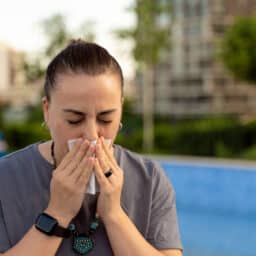Why You Shouldn’t Ignore Your Allergies

Allergies are a widespread issue in the U.S., affecting over 100 million people annually. Often dismissed as a minor inconvenience, allergies can lead to significant health problems and impact your quality of life. Recognizing the importance of managing allergies can encourage you to seek effective treatment and management strategies. Impact on Daily Life Allergies can…
What to Do If Allergies Are Triggering Your Asthma

Asthma is a chronic respiratory condition where the air passages become inflamed and overly sensitive to various stimuli. Triggers can range from physical activity and airborne elements to changes in weather, specific medications and allergens. For those dealing with allergic asthma, identifying and understanding these triggers is crucial for managing the condition. Allergic reactions happen…
What Is Sublingual Therapy and Is It Right for You?

Allergies are the sixth-leading cause of long-term illness in the United States, and for people struggling with severe symptoms, the condition can be more than a little bothersome. Imagine you planned a delicious picnic at Spencer Creek Park, only to find that you were met with itchy eyes, congestion and relentless sneezing upon arrival. If…
Managing Hay Fever for a Better Spring

The official season of spring runs from March 19th through June 20th. Spring can feel like a breath of fresh air for those tired of chilly weather and thick coats. For those with hay fever, however, spring may not be all warm air and fun days at Forest Park. Don’t let sneezing and itchy eyes…
Exploring Allergies: How They Affect the Ears, Nose and Throat

Allergies occur when the body’s immune system reacts to substances that are generally not harmful, such as pollen, mold, or pet dander. In the U.S., allergies affect more than 100 million individuals annually, making them the sixth primary cause of chronic disease. Symptoms typically occur in the ears, nose and throat and include itching, swelling,…
Understanding Nasal Fractures: Causes, Symptoms and Treatment

Nasal fractures, commonly referred to as a broken nose, are a prevalent injury, accounting for approximately 40% to 50% of all facial fractures. Whether it’s a sports injury, a car accident or an altercation, nasal fractures can cause discomfort and affect appearance and breathing. Understanding the causes, symptoms and treatment options for nasal fractures is…
The Connection Between the Ears, Nose and Throat: Understanding Your ENT Health

Have you ever wondered how a simple cold can simultaneously wreak havoc on your ears, nose and throat? Or how a stuffy nose can keep you from enjoying a delicious picnic in Spencer Creek Park? This is where otolaryngology, a specialized branch of medicine focusing on the ears, nose and throat (ENT), steps in. Surprisingly…
A Comprehensive Guide for Caring for Your Child’s ENT Health

The cornerstone of good ENT health for your child lies in maintaining overall healthy lifestyle habits. Establishing a regimen of nutritious eating, exercise and adequate hydration can help to prevent numerous ENT-related issues, such as ear infections or throat aches. Ways To Avoid Illness Visits to the ENT are common, with approximately 27 million individuals…
What To Know About Voice Hoarseness

Dysphonia, or voice hoarseness, is a common phenomenon causing a voice change. You may have experienced dysphonia following a night out with friends, a concert at the Hollywood Casino Amphitheater or even as a result of dry air in your home. While dysphonia is not always a cause for concern, it can be a symptom…
What To Know About Dysphagia

Struggling with swallowing food or drinks, also known as dysphagia, can detract from the simple joys of life, such as enjoying your favorite drink at Tropical Smoothie Cafe. While it’s common to experience swallowing difficulties occasionally, ongoing problems may necessitate a visit to an ENT (ear, nose and throat) specialist for diagnosis and treatment. Understanding…
